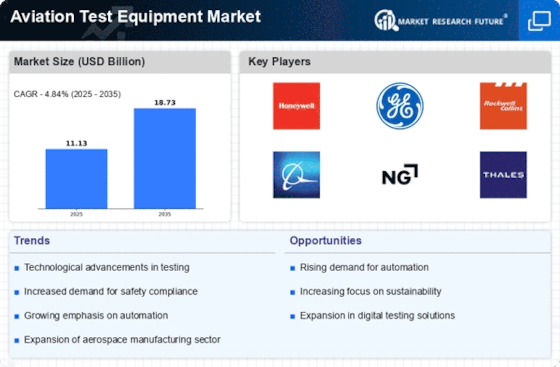Top Industry Leaders in the Aviation Test Equipment Market

Strategies Adopted: In the fiercely competitive Aviation Test Equipment market, key players employ strategic approaches to maintain a competitive edge. A central focus is on continuous investment in research and development (R&D) to keep pace with technological advancements in aircraft systems. Strategic partnerships with original equipment manufacturers (OEMs) and airlines facilitate collaboration in the development and testing of new technologies. Additionally, global expansion through acquisitions, collaborations, and the establishment of service centers worldwide allows companies to address the diverse testing needs of the global aviation industry.
Competitive Landscape of Aviation Test Equipment Market
- 3M Company (US)
- General Electric Co (US)
- Rolls Royce Holdings Plc. (England)
- The Boeing Company (US)
- Honeywell International Inc (US)
- Teradyne Inc (US)
- Rockwell Collins Inc. (UK)
- Lockheed Martin Corporation (US)
- Airbus Group (France)
- Testek Solutions (US)
- ATEQ Aviation (France)
- Viavi Solutions Inc. (US)
Factors for Market Share Analysis: Market share analysis in the Aviation Test Equipment market considers various factors essential to a company's competitive standing. Technical capabilities, such as the ability to provide testing solutions for a broad range of aircraft systems, avionics, and components, play a pivotal role. Companies offering comprehensive testing capabilities, including those for navigation systems, communication equipment, and flight control systems, are better positioned to capture a larger market share. The adaptability of test equipment to diverse aircraft platforms, compliance with aviation regulations, and the ability to provide efficient and accurate testing services contribute significantly to market share dynamics.
New and Emerging Companies: While established players dominate the market, new and emerging companies contribute to the innovation and evolution of aviation testing solutions. Companies like Avtron Aerospace and Testek Solutions are gaining recognition for their specialized test equipment and testing services, often focusing on specific aircraft components or emerging technologies. Emerging companies frequently bring agility and a fresh perspective, introducing novel approaches and technologies that address the evolving testing requirements in modern aviation.
Industry News: Recent industry news in the Aviation Test Equipment market underscores ongoing developments and trends shaping the industry. Innovations in advanced testing technologies, such as the integration of artificial intelligence (AI) and data analytics for predictive maintenance, are gaining prominence. News often covers advancements in portable and handheld testing equipment, providing flexibility and efficiency for on-the-go testing needs. Additionally, developments in testing solutions for emerging aviation technologies, such as electric and hybrid-electric propulsion systems, highlight the industry's responsiveness to evolving trends. Industry news reflects the dynamic nature of the Aviation Test Equipment market, with continuous efforts to enhance testing capabilities and address the challenges posed by evolving aviation technologies.
Current Company Investment Trends: Investment trends in the Aviation Test Equipment market underscore a commitment to technological innovation, adaptability, and global reach. Companies are allocating substantial resources to R&D initiatives focused on developing advanced testing technologies, including AI-driven testing solutions, automated test equipment, and virtual testing platforms. Investments in cybersecurity measures for testing equipment, as aviation systems become more interconnected and digitized, are gaining importance. Strategic acquisitions of technology startups, partnerships with aviation research institutions, and collaborations with key industry players contribute to a comprehensive approach, ensuring a continuous stream of cutting-edge solutions and maintaining a competitive stance in the market.
Overall Competitive Scenario: The overall competitive scenario in the Aviation Test Equipment market reflects a balance between established industry leaders and emerging companies that bring innovation and flexibility to the sector. Established aerospace manufacturers leverage their extensive experience, global reach, and comprehensive testing portfolios to set industry standards. Simultaneously, emerging companies contribute to the diversification of testing solutions, often focusing on niche applications or introducing disruptive technologies. The industry's response to evolving aviation technologies, the demand for increased efficiency, and the growing complexity of aircraft systems highlight the adaptability and resilience of Aviation Test Equipment providers. As the aerospace industry continues to advance, with a focus on digitalization, electrification, and sustainable aviation, the Aviation Test Equipment market is poised for continued evolution. The emphasis on technological advancements, strategic collaborations, and meeting the dynamic testing needs of modern aircraft positions this market as a critical enabler for the safety, reliability, and efficiency of aviation systems worldwide.
Recent Development:
February 2022, the U.S. Federal Aviation Administration (FAA) announced the commencement of field trials for small drone traffic management in airspace below 400 feet, starting in the spring. These tests will provide valuable insights to the FAA, guiding the formulation of new regulations and assisting industry groups in enhancing standards for enabling drones to operate beyond the visual line of sight. The proliferation of such testing initiatives is anticipated to contribute to the growth of the North American drone market.











